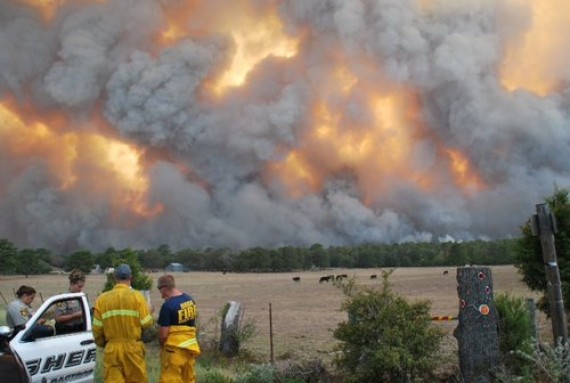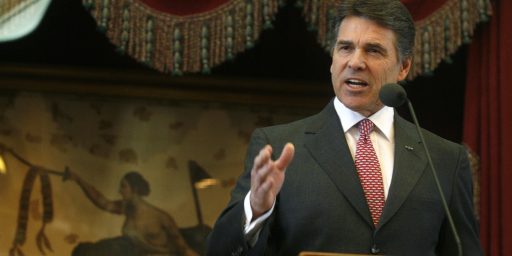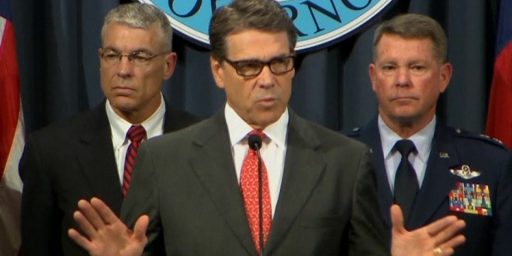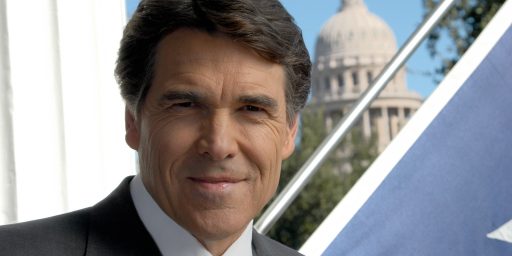After Drought, Wildfires Rage Across Texas
It’s already caused Rick Perry to cancel a planned campaign appearance in South Carolina, and it may yet lead him to back out of tomorrow’s debate in California, but the real story in Austin is the fact that large swaths of Texas are burning:
Another fire in eastern Texas killed a mother and her 18-month-old child when flames engulfed their mobile home Sunday near Gladewater, the Gregg County Sheriff’s Department said.
“We got a long way to go to get this thing contained,” Gov. Rick Perry said about the fire raging near Austin. “I have seen a number of big fires in my life. This one is as mean looking as I’ve ever seen.”
Dozens of fires are burning across the parched state, the Texas Forest Service said Monday.
Earlier, the governor issued a statement in which he called the wildfire situation in Texas “severe” and said that all state resources were being made available to protect lives and property.
“We will pick up the pieces. We always do,” he told reporter
Texas is battling its worst fire season in state history. A record 3.5 million acres — an area roughly the size of Connecticut, Perry said — have burned since the start of the season in November as hot and dry weather, coupled with a historic drought, made conditions ripe for rapid fire growth.
Even without considering the fires, the Texas drought is on pace to be an extremely costly natural disaster, perhaps surpassing that of Hurricane Irene:
Texas Agrilife Extension Service estimated losses to be at $5.2 billion — already greater than the $4.1 billion of losses from the 2006 drought. “This drought is just strangling our agricultural economy,” professor Travis Miller, of Texas A&M University’s Department of Soil and Crop Sciences. Losses, told TIME Magazine.
The extended heat wave that has exacerbated the drought is expected to break soon, but without rain, farmers will have no relief before planting winter wheat in September or October. Texas produces one-third of winter wheat in the U.S., so analysts expect price increases if there is not enough rain for the wheat crop. Already from the summer, Texas, which produces 55 percent of U.S. cotton, has lost half its cotton crop. And scant summer rain has led to a scarce hay crop, so some ranchers are selling off cattle herds because they can’t afford to continue providing feed and water. The short-term price in beef may drop, but the long-term implications of losing entire herds will push up the price soon enough.
The remnants of a hurricane sweeping north from the Gulf of Mexico would go a long way toward alleviating the immediate risk of fire, if not end the drought itself, but so far this season there have been few hurricanes that have made it to the Gulf, and the one tropical system that developed there, which is a major rain producer now making its way to the Mid-Atlantic and the Northeast, avoided Texas entirely. The question for Texas is whether this drought, and the fires that resulted from a long summer of high temperatures, are an anomaly, or something that can be expected to happen repeatedly given the impact that continued rapid growth has had on the surrounding area.







This makes no sense to me, Doug. Are you speculating that rapid growth has caused a record heat wave and drought?And beside the bizarre idea that “rapid growth” can have catastrophic effects on local weather, have you actually looked at a drought map for Texas, and compared it to population density in the state?
Virtually the entire state is in the worst drought in its history. I would humbly suggest Perry’s Prayer Strategy isn’t effectively addressing the problem.
Perhaps this is a sign from God opposing Gov. Perry’s candidacy. /sarcasm
@Boyd:
I was more referring to putting population centers in areas subject to drought and wild fires.
@Ben Wolf: Well, it ain’t hurt any, and it made some people feel better.
And this is one of the drawbacks of a presidential candidate with a position of real authority running for higher office. Perry, like Palin and Bush, had to choose between campaigning and governing, and tried to strike a balance. On the other hand, I recall Obama and Kerry pretty much blowing off their Senate jobs to run. And McCain, the one time he left the campaign trail for the Senate, got thoroughly lambasted for rushing back to DC.
J.
@Doug Mataconis: People choose to live in bad places. In this case, it’s drought-prone areas. Others, it’s fault lines, beaches that get hurricanes and mudslides, flood plains, or port cities below sea level.
J.
@Doug Mataconis: Well…okay, I suppose. That still doesn’t make much sense to me, since Austin has been here for 180 years. Also, since the drought covers pretty much the whole state of Texas (which, you may be aware, covers kind of a large area), the vast majority of which is populated solely by non-humans, I suppose you’re advocating depopulating the entire state.
Nope, I still can’t make much sense out of your still-bizarre statement.
@Boyd:
Well we could start with the stress that increased population puts on water supplies and the changes to terrain that come with development. I’m not pretending to be an expert on these issues, and I think it’s rather premature for people to point to something like this and yell “Climate Change!” like some people are just raising a point.
@Jay Tea:
Yes but should we subsidize people when they choose to live in those “bad places”?
Best of luck to Texas – it sounds like they need it. It’s too bad we in the Northeast can’t just send them some of the excess water we’ve been getting.
@Boyd:
Give it up while you still have your sanity, he is never going to back down and admit he said something stupid.
His name is Doug Mataconis, he can never be wrong, he can only be wronged.
@Doug Mataconis:
I’m sure as hell you’ll petition to subsidize their moving costs and provide new jobs for them, Doug. Oh wait, you won’t.
Can I have the same glib attitude as you do when your home is crushed by falling trees and say that you deserve it for living near a “woodland area?” How about if the majority of population, which lives in urban areas, refused to subsidize suburban and rural lifestyles? I’m sure you would enjoy that.
I love how when any disaster strikes, the libertarian is quick to put the blame where it rightfully belongs, on the victims. Obviously, the people of Texas consciously chose to live in a dry state, and we should refuse to subsidize them in anyway.
@Boyd: Rapid population growth in Texas and the rest of the Southwest has put significant strain on water supplies, even before the current record drought. There are ongoing battles between states, municipalities and individuals over water rights which have only intensified, depletion of the Ogalala Aquifer being one of the many issues involved. We’ve come to a point where cities and farms simply can’t get enough water to meet their demands.
@Ben Wolf: So, you believe that Texas’s current drought is due to depletion of the Ogallala Aquifer, Ben?
@Boyd:
No, I think you didn’t bother to read the sentence: There are ongoing battles between states, municipalities and individuals over water rights which have only intensified, depletion of the Ogallala Aquifer being one of the many issues involved.
@Ben Wolf: And all of that has virtually nothing to do with our current drought, Ben.
@Boyd: No one suggested it did. What it does have something to do with is the ability of population centers to draw on already depleted reserves during a drought. If you have adequate reserves you can usually make it through. Much of the Southwest, and particularly Texas, doesn’t.
The whole point of reserves is that they allow arid locations to draw more water than is typically available through the hydrological cycle. When they are completely gone, as is happening, the population will relocate. With continued population growth that outcome is inevitable; Texas can’t manufacture water.
@Ben Wolf: I don’t know about that, Ben. The current drought is one of the worst ever seen in Texas, and while we’re understandably implementing water restrictions, we’re faring quite well in those populated areas that Doug thinks contribute to droughts, or whatever it is that he’s thinking.
At any rate, the problems we’re having with fires right now is almost (but not completely) due to…wait for it…a lack of rain over the past year. Shocker, I know.
So if you’re talking about something else, it strikes me as a non sequitur in the current discussion.
@Doug Mataconis:
The fact that this very modest, conservationist statement engenders so much befuddlement and even irritation in a commenter as normally astute as Boyd really saddens me.
@Ben Wolf:
Perry prayed for rain, and he got fire. I think God is having a long opposite day, Perry should start praying for fire.
@Rob in CT:
If only the NAFTA superaqueduct had been built…
@Doug Mataconis: Yes but should we subsidize people when they choose to live in those “bad places”?
Two words, Doug:
“New Orleans.”
City’s in a frickin’ man-made basin below sea level.
J.
@Rick Almeida: Thanks for the back-handed compliment, Rick, but my point remains: what conservation approaches could have been taken to prevent the drought and/or the fires? What could we have done, short of not living in Texas, that would have had a substantive effect?
Good thing the Texas government cut the budget of the Texas Forest Service by a third over the next two years.
Meanwhile, Perry is asking for a major federal disaster designation so Texas can get federal aid money.
Let’s see if Cantor is consistent and says “No Aid for Texas without matching Cuts”
I’m guessing… Not.
Oh yes, indeed, because praying is such an effective governing strategy…and on the same topic, it really doesn’t say much positive about someone’s governing ability when she quits during her first term in office…
@Boyd:
First, my apologies. I meant my compliment sincerely, and if it came across as back-handed, that was unintentional.
Second, let me clarify my comment, as it seems I wasn’t clear. I don’t see how it is at all controversial to observe that increasing population increases demand on natural resources like water. I don’t see how it is at all controversial to observe that development often takes away, for example, drainage areas – this is an issue in the Southeast, where I live.
I have no idea whether or not what you term “conservation methods” could have alleviated drought/wildfires/whatever in Texas. That’s not something I have any expertise or training in. However, I don’t see how that’s germane.
The fact remains that development has costs, and I am increasingly distressed that it seems to me that even the most reasonable conservatives (I am no liberal) appear more and more inclined to speak as if the natural world either doesn’t exist or is completely immune to effects of human behavior.
@Rick Almeida: Like you, I seem to not have made my own point clear. I have no disagreement with general statements such as needing to take sensible steps to not waste water, as well as doing our best to ensure any topographical changes we make to support development take conservation into account.
Here’s my point, though: this post was about the fires currently wreaking havoc in Texas, as well as the extreme drought which has provided so much fuel for the fires. Neither of these is happening because of Man’s actions (short of the possibility that human action could well have been the catalyst for any given fire, of course). The implication that these have resulted because of “rapid growth” is offensive to me, though.
I would like to know where these “safe” places to live are. I went to high school and college in Tuscaloosa, got smashed by tornadoes. I lived in NYC, got hit with a hurricane, I live in Nashville, floods. Lived as a child in Kansas, known for tornadoes. Where the heck are people supposed to live that is “safe”? I mean, geez, VERMONT got hit with a hurricane. California is out due to drought, mudslides and earthquakes. We now know that the east coast is not safe from earthquakes. Texas has it’s drought and fires. Someone please help me out here.
@Doug Mataconis:
But these are not areas that prone to drought an wild fires (not like this). I have lived the bulk of my life in Texas (although I no longer do) and while I can remember droughts and heat, there has been nothing like these fires in my lifetime. This isn’t, as it seems you are suggesting, like building in a flood plane or n a barrier island. This is an unprecedented event.
I haven’t eaten red meat for years.
There are plenty of healthier substitutes.
You lie! Palin was dragged, kicking and screaming from office by left wing hate squads.
Pain and misery for people they hold in contempt. Finally something for libs to cheer about!
Here is a great map that shows the fires and drought in Texas. Pretty unbelievable.
http://bheberto.com/brendansweather.php?id=28